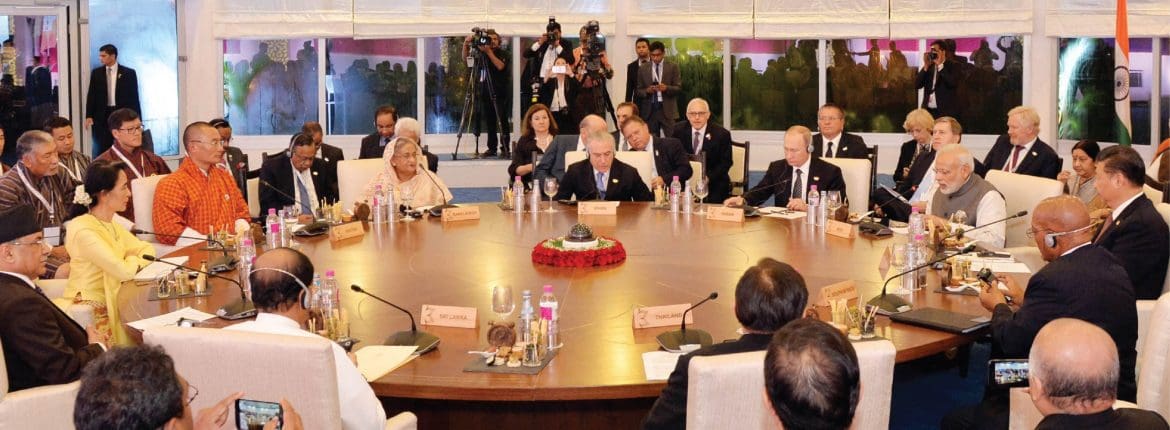With the possibility of Bangladesh joining BRICS, take a look at the prospects and challenges of Bangladesh in terms of global peace and prosperity.
BRICS is not a military alliance or an economic bloc. Its membership conforms with Bangladesh’s foreign policy, which advocates for neutrality and peaceful relations with other countries. BRICS emerged as an informal group in the mid 2000s as gatherings of foreign ministers of Brazil, Russia, India and China. The world then still had space for forming different groupings as complementary forces to promote multilateralism. Based on informal meetings of these nations’ foreign ministers began in 2006, more official annual summits started in 2009. It was once referred to as BRIC, but after South Africa joined the informal group in December 2010, the acronym was changed to BRICS. BRICS has already become an influential group in the world. Five leading economies of the world are members of the group. BRICS has command in the global economy in terms of its contribution to global GDP and a share of rising middle-class consumers. It represents more than forty percent of the population of the world. At present, the five BRICS countries account for 31.5% of the world’s GDP. By 2030, it is anticipated that the BRICS will contribute more than 50% of the world’s GDP, and the proposed expansion virtually probably moves that goal up.
The possibility of Bangladesh’s joining the BRICS is a significant move for the diversification of Bangladesh’s foreign policy domain. Bangladesh’s association with BRICS has different advantages and it may be a good decision for Bangladesh to accept the invitation to join BRICS and contribute to strengthening the unity of BRICS. Analysts have already argued that joining the BRICS will create new opportunities for Bangladesh in multiple sectors – from diplomacy to economy. Bangladesh has developed its relations with BRICS a couple of years earlier. Bangladesh became a member of BRICS initiated multilateral financial institution called New Development Bank (NDB) in 2021. Bangladesh has remained highly proactive and progressive in dealing with the global issues for which it saw huge prospects of multilateral diplomatic forum such as BRICS before the current phase of global geopolitics, harping on the Ukraine War and Sino-US rivalry.
Relevance of BRICS in the Current Era
The relevance of BRICS has increased today. It works like G7 of the industrialized countries in the world. Like G7, BRICS discusses global challenges and coordinates common policies for global collective goods. There are many challenges in the world. Those challenges cannot be overcome by a single state or even we see that some global initiatives are not working. World Trade Organization (WTO) talks, global climate change deals and United Nations Reform agenda are not delivering the outcomes that are expected. But if groups like BRICS work together by taking Bangladesh and some other countries as new members that will help to deal effectively with those common challenges like global financial crisis, energy crisis, global climate change, refugees and migration, etc. Moreover, some geopolitical problems like the Ukraine war and many bilateral and regional conflicts exist around the world. The arms race is also a major trend in the world. BRICS provides an “alternative vision” for the developing states amid the “polarized” global environment riven by differences between the US-led western powers and China and Russia.

Since its foundation, BRICS has created an impact on international relations and has become more important now, especially as geopolitics has come to the forefront following the Ukraine conflict and the tensions around Taiwan. BRICS has become an important platform where countries and emerging economies of Asia-Africa-Latin America are discussing their common challenges and opportunities, which are quite different than those faced by Europe or the US. Bangladesh’s economy has been on a fast-growth trajectory over the last few years, it’s important for the country to seek further opportunities globally and increase its cooperation and bilateral relations. The current period is a crucial one for Bangladesh to consolidate its gains and look for greater opportunities, especially to mitigate the impacts of global energy and food crises.
Now there are multiple powers and each has its own interests. There is a larger interdependence between countries, especially in terms of trade. In this changed reality, none of the countries is going to follow the diktats of any superpower but build relationships with one another independently and for their self-interests. Hence, in this scenario, it’s more beneficial for Bangladesh to seek opportunities by becoming part of important platforms like BRICS, where more such countries are coming. At present, many nations in Asia, Africa and Latin America countries have been coming under a lot of pressure exerted by external big powers. These are the extra-regional powers with their own matrix of geopolitical interests. In other words, there has been a polarization globally and such polarization has been affecting Bangladesh’s foreign policy and diplomacy.
Bangladesh’s Foreign Policy and BRICS
Bangladesh’s quest for BRICS’ membership is in line with its foreign policy of conducting “multilateral diplomacy” without being part of any geopolitical bloc. The foreign policy dictum of Bangladesh, ‘friendship to all, malice towards none’ allows Bangladesh making friends and partners for mutual cooperation and interests bilaterally and multilaterally. Bangladesh has also been a champion of forging an independent foreign policy path, which could serve as a model for other developing nations. Bangladesh has clearly demonstrated to the world that the country is against any war, arms race, unilateral sanctions, polarization, rivalries and coercive diplomacy. By joining a larger group, Bangladesh would have the opportunity to engage in dialogues, negotiations, and cooperation with a diverse range of nations. This would strengthen its diplomatic ties and promote mutual understanding among countries. Collaboration within the group can result in the exchange of knowledge and the development of capacities.
It was wrong on the part of certain analysts to view BRICS as an “anti-west grouping”, as Dhaka’s BRICS membership had nothing to do with its differences with the US and other countries. It is part of diplomacy for any country. Bangladesh is engaged with many countries, including those which are not part of BRICS. Of course, geopolitics and national interest do play a part in any decision. There are several groups of countries where countries from different backgrounds are their members. For example, G20, Shanghai Cooperation Organization (SCO), Asian Pacific Economic Cooperation (APEC), D-8, and ASEAN Regional Forum (ARF). The membership will certainly add to diversification of international relations of Bangladesh.
Seeking Larger Global Economic Partnerships for Bangladesh
Bangladesh’s interest in joining the BRICS grouping— Brazil, Russia, India, China, and South Africa— is geared towards boosting its economic ties with other developing nations, including China and India. BRICS members such as China and India have been Bangladesh’s biggest trading partners of Bangladesh. Bangladesh’s BRICS membership will serve as a platform to boost economic coordination with these nations, as well as other developing countries. Bangladesh’s BRICS membership would afford it more space in tackling the economic challenges, though Dhaka remained on a strong economic footing. A leading economist in Bangladesh, Mustafizur Rahman argues, “I see the decision to join BRICS positively. The importance of cooperation among developing countries is growing day by day. The more we can diversify our foreign relations, the better we will do. It will have a role in trade and finance.”
Bangladesh is also financially engaged with BRICS through its membership to NBD. Bangladesh has also become a member of the Asian Infrastructure Investment Bank (AIIB) and received the very first loan disbursed by the bank. It is also important to keep it in mind that three BRICS countries – India, Brazil and South Africa respectively – will serve the G-20 (19 countries and the European Union forum) as its president in the next three terms. Bangladesh has about US$ 40 billion trade with BRICS which will certainly increase, with the expanded BRICS and wider opportunities for trade and investment. In economic domain, Bangladesh has the prospects of benefiting in five major areas: expanded international market; two-way investment opportunities; bargaining capability on economic issues; reducing dependence on the traditional sources of trade and investment; and collective capacity building for dealing with the 4th Industrial Revolution.
Win-Win Framework
BRICS provides a win-win framework for its members to achieve mutual benefits. Bangladesh can be part of this win-win framework where member nations reflect a solidarity and unity in terms of their common history and experiences of exploitation for centuries. The group ensures equal treatment of its members based on mutual respect, cultural roots, and sovereignty. It is a perfect forum for sharing views and experiences for mutual prosperity and security. Expertise and best practices are frequently shared among member nations in a variety of industries, including healthcare, education, technology, and agriculture. This knowledge exchange will help Bangladesh improve its capabilities and advance as a whole, therefore Bangladesh stands to gain from it. Participating in collaborative research and development initiatives can also encourage creativity and aid in tackling global concerns. Furthermore, having a greater voice in international forums might come from belonging to a larger organization. It can actively participate in influencing global policies and choices by speaking up for its interests and concerns on international forums. By ensuring that its concerns are taken into account by the international community, Bangladesh can address significant challenges like climate change, sustainable development, and human rights thanks to its enhanced influence.
In the current world, there is an urgent need to mitigate external risks and unfavorable situations stemming from the uneven global order, especially for the emerging economies of the Global South. Due to such kind of adverse situations, countries must seek a space, not necessarily a military or regional bloc, to expand their horizon and to find common grounds. Since BRICS is not a new group, there is hardly any scope to oppose its existence by the West or any great power. Similarly, it is absolutely untenable to argue that Bangladesh’s membership to BRICS will create any commotion among the Western powers. It is part of global diplomacy. If there is a need for a sort of balance in the world, powerful countries should behave responsibly, to behave in a way that would contribute to global peace and cooperation, not to global rivalries or conflicts. BRICS and Bangladesh can work together on a common goal of advancing global economy for the benefit of humankind and at the same time, making the world more peaceful, equitable and harmonious.
The cover photo has been taken from ICE Business Times.
About the Author

Delwar Hossain, PhD is Professor of International Relations, University of Dhaka, Bangladesh. He is currently the Chair (Honorary) of the KRF Center for Bangladesh and Global Affairs (CBGA)
